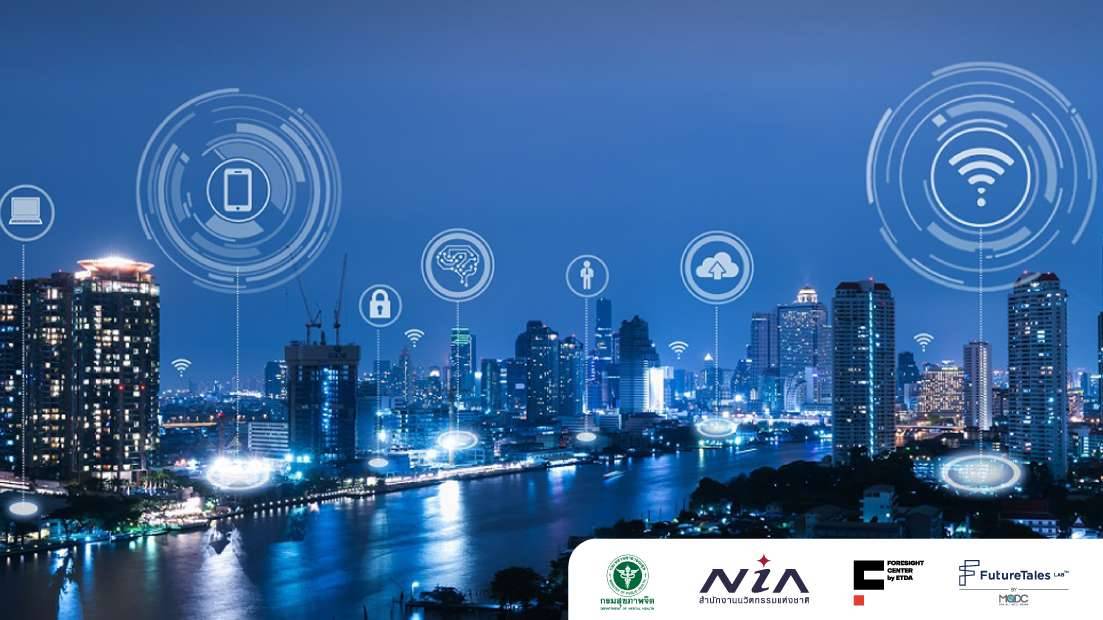
Ambient Intelligence
ARTICLES | Mar 03, 2023
Writer: Nuttawut Kulkaew
Editor: Wittaya Wonglor
Smart technology in our home and cities will soon play a big role in our lives and mental health.
Ambient intelligence (AmI) is AI and various technologies, such as sensors, IoT, and machine learning, to modify or enhance the environment for living comfort, safety, entertainment, and other needs in line with individual needs. The concept is increasingly relevant mental health and well-being. Cities can install infrastructure and public services such as intelligent traffic systems, smart classrooms, and innovative healthcare systems. Smart homes and buildings assist enterprises and households.
The intelligent environment won’t just improve quality of life. It will also boost environmental, physical, emotional, occupational, intellectual, financial, social, and spiritual well-being. People will access information about city facilities and manage their schedule for living, working, learning, moving, playing, and sustainability. They can work out travel to their destination from traffic forecasts in coordination with stakeholders at each point. By 2030, then the smart city market size will reach an estimated $7 trillion with a compound annual growth rate of 24.1% in 2022-30, with energy management taking the largest market share (57%).
The ambient management of the home or building environment will play an essential role in monitoring, evaluating, and managing a person's physical and mental health. It is estimated that by 20230, the smart home market size will reach $537 billion with a compounded average annual growth rate of 27.04% in 2022-30. AI-based monitoring in smart homes might be designed to measure and track emotional states, hormone levels, stress, loneliness, eating habits, sleep habits, and exercise of each resident to provide advice and design a lifestyle plan such as food and nutrition programs, exercise schedule, reminder system for doctor's appointments and taking medicines. Local mood signals could be displayed through lighting systems.
Implications for the future:
- Artificial intelligence will be more essential and applied in every dimension of daily life.
- Having access to and knowing everything about one's life and possessions in real time will become the new value of people in the future.
- The values of people starting to fear, resist, and dislike the ambient intelligent environment may lead to demands for technology-free spaces.
- Technology that reports a person's mood and displays it through room lighting could be used in psychology experiments, lie detection, and investigative agencies.
- Ambient intelligence management may play a role in managing the emotional state of the residents of a smart home through creating atmospheres such as selecting music, lights, scents, and air fresheners, and opening various functions in the house, such as a shower room, sauna room, meditation room to soothe the mind and relieve stress for residents according to individual tastes.
- There may be discussions about the right to access mental health information for individual households in the community with relevant organizations such as local governments or a mental health hotline.
Reference:
- Effect of User Personality on Efficacy of a Mental Support System Based on Ambient Intelligence: A Case Study https://www.frontiersin.org/articles/10.3389/fcomp.2021.702069/full
- Re-Imaging the Future in Urban Studies and Built Environment Discourse: A Neurourbanism Perspective https://doi.org/10.3390/buildings12122056
- Big data and ambient intelligence in IoT-based wireless student health monitoring system https://doi.org/10.1016/j.avb.2021.101601
- Intelligent environments for all: a path towards technology-enhanced human well-being https://link.springer.com/article/10.1007/s10209-021-00797-0
- Smart Home Market Size https://www.grandviewresearch.com/industry-analysis/smart-homes-industry
- Smart Cities Market https://www.precedenceresearch.com/smart-cities-market
Want to know more about us? Click https://web.facebook.com/FutureTalesLABbyMQDC or follow at https://www.blockdit.com/futuretaleslab











